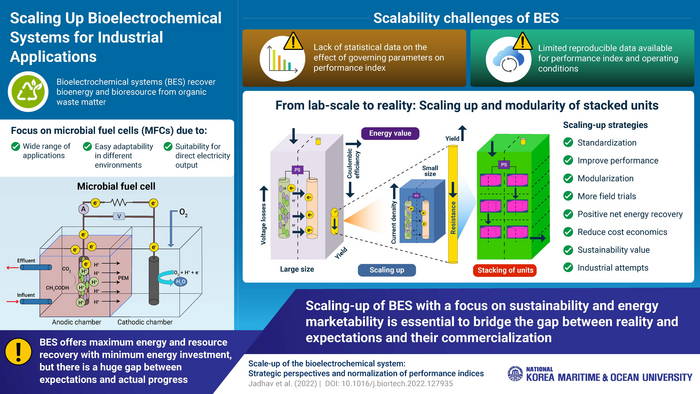Microbial electrochemical technologies (METs) have recently emerged as a tool for recovering bioenergy and bio-resource from organic waste matter. This can help with long-term energy generation during wastewater treatment. METs, commonly expressed as bioelectrochemical systems (BES), offer maximum resource and energy recovery with minimum energy investment. However, there is currently a mismatch between expectations and actual progress in BES technologies due to a lack of reproducible and statistical data, which hinders their scalability and, in turn, commercialization.

Credit: Dr. Dipak A. Jadhav from KMOU, Korea
Microbial electrochemical technologies (METs) have recently emerged as a tool for recovering bioenergy and bio-resource from organic waste matter. This can help with long-term energy generation during wastewater treatment. METs, commonly expressed as bioelectrochemical systems (BES), offer maximum resource and energy recovery with minimum energy investment. However, there is currently a mismatch between expectations and actual progress in BES technologies due to a lack of reproducible and statistical data, which hinders their scalability and, in turn, commercialization.
Set against this backdrop, an international team of researchers, led by Dr. Dipak Jadhav and Prof. Kyu-Jung Chae from Korea Maritime and Ocean University (KMOU), has now published a study in Bioresource Technology Journal addressing this issue. The study was made available online on September 10, 2022, and was published in Volume 363 of the journal in November 1, 2022.
“For industrial applications, the scaling up of bioelectrochemical system is an important concern before moving ahead with their commercialization. Our study provides strategies that can be adopted to achieve this end,” explains Dr. Jadhav. “Such a technology will be a value addition for the recovery of resources including biohydrogen, electricity, industrial chemicals.” On this front, a review of recent research revealed the need for a systematic rethinking of net energy recovery, resource yield, and current production, with a focus on sustainability and energy marketability, for the scaling-up of METs.
The most important need identified was the standardization of performance indices, which helps assess the performance of various BES. Additionally, the team proposed a single frame for normalization methods to allow for precise data comparison to existing treatments. These technological implementations, the study suggests, will effectively address the existing concerns with BES. This, in turn, would help attract the business market, stakeholders, and investors, paving the way for their commercialization. “We expect that, based on our highlighted strategies for up-scaling BES technologies, we can harness their potential for resource recovery by converting the chemical energy of wastewater into valuable resources during on-site treatment at an efficiency that is comparable with conventional methods,” concludes an optimistic Prof. Kyu-Jung Chae.
And we hope his visions are not far from being realized!
***
Reference
DOI: https://doi.org/10.1016/j.biortech.2022.127935
Authors: Dipak A. Jadhav1, 2, Ashvini D. Chendake3, Vandana Vinayak4, Abdulaziz Atabani5, Mohammad Ali Abdelkareem6, 7, 8, Kyu-Jung Chae1, 2,
Affiliations:
1Department of Environmental Engineering, Korea Maritime and Ocean University
2Interdisciplinary Major of Ocean Renewable Energy Engineering, Korea Maritime and Ocean University
3Department of Agricultural Engineering, Maharashtra Institute of Technology
4Diatom Nanoengineering and Metabolism Laboratory (DNM), Dr. Harisingh Gour Central University
5Alternative Fuels Research Laboratory (AFRL), Department of Mechanical Engineering
6Department of Sustainable and Renewable Energy Engineering, University of Sharjah
7Center for Advanced Materials Research, University of Sharjah
8Chemical Engineering Department, Minia University
About
South Korea’s most prestigious university for maritime studies, transportation science and engineering, the National Korea Maritime & Ocean University is located on an island in Busan. The university was established in 1945 and since then has merged with other universities to currently being the only post-secondary institution that specializes in maritime sciences and engineering. It has four colleges that offer both undergraduate and graduate courses.
Website: http://www.kmou.ac.kr/english/main.do
About the authors
Prof. Kyu-Jung Chae is a full Professor of Environmental Engineering at Korea Maritime and Ocean University (KMOU), Korea. Before joining KMOU, he completed his PhD in Environmental Engineering at Gwangju Institute of Science and Technology (GIST), Korea. He has spent over 21 years working in both academia and the industry. His understanding of real needs in both fundamental and practical environmental research stems from his balanced experience. He has 127 articles and 6235 citations credited to him.
Dr. Dipak Ashok Jadhav is a researcher in the field of bioelectrochemistry invited through the Brain Pool project. He received his M.Tech & PhD in Water Management from Indian Institute of Technology Kharagpur in West Bengal, India. His research interests lie in microbial fuel cells, microbial electrolysis cells, and biological wastewater treatment systems. He has 66 articles and 1337 citations credited to him.
Journal
Bioresource Technology
DOI
10.1016/j.biortech.2022.127935
Method of Research
Literature review
Subject of Research
Not applicable
Article Title
Scale-up of the bioelectrochemical system: Strategic perspectives and normalization of performance indices
Article Publication Date
1-Nov-2022
COI Statement
The authors declare that they have no known competing financial interests or personal relationships that could have appeared to influence the work reported in this paper.




